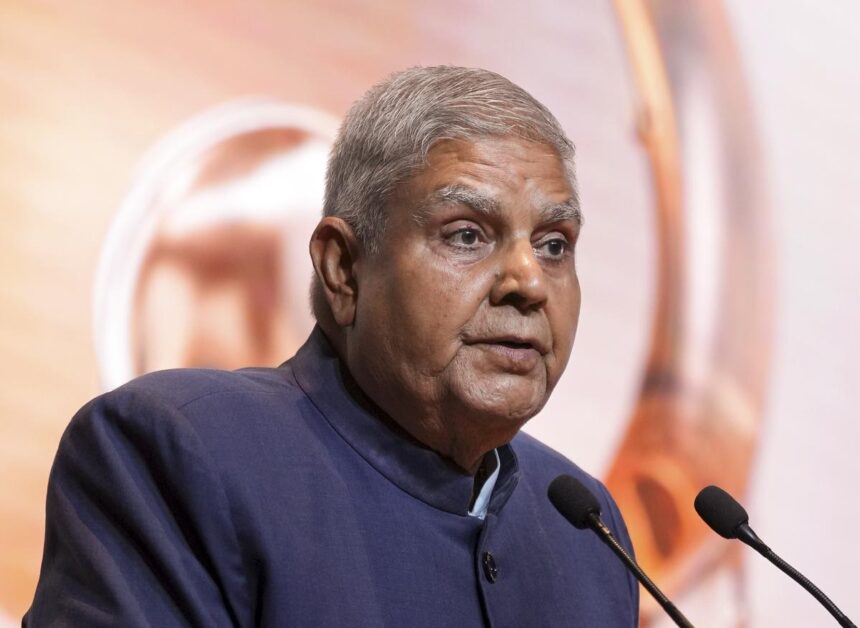NEW DELHI – A wave of surprise has swept through Indian politics after Vice President Jagdeep Dhankhar handed in his resignation on Monday evening, 21 July 2025. He said health worries made this decision necessary, choosing to step down on the opening day of Parliament’s Monsoon Session.
The abrupt move has set off fresh debates about what prompted his departure, how it might affect Prime Minister Narendra Modi’s administration, and where Dhankhar might go next. People across the country are left wondering what this will mean for India’s leadership, the Rajya Sabha, and the National Democratic Alliance.
Dhankhar Steps Down Over Health Issues
In his letter to President Droupadi Murmu, Dhankhar, 74, referred to Article 67(a) of the Constitution. He wrote that he would resign as Vice President of India with immediate effect to focus on his medical care.
Jagdeep Dhankhar thanked President Murmu for her support and recalled their good working relationship. He expressed gratitude towards Prime Minister Modi and the Council of Ministers, calling Modi’s help invaluable during his time in office.
He also acknowledged MPs’ encouragement and described his service as a privilege during a period of strong economic growth in India.
Over the past few months, concerns about Dhankhar’s health have grown. In March 2025, doctors at AIIMS in Delhi performed angioplasty on him after cardiac problems. In June, he briefly fainted during an event at Kumaon University but soon recovered.
Despite these incidents, he continued with his duties, including chairing the Rajya Sabha on the day he resigned. The sudden nature of his decision has led many to wonder if health was the only reason behind his exit.
Questions Raised by Political Circles and the Opposition
Jagdeep Dhankhar resigned just hours after overseeing a busy day in the Rajya Sabha, where he accepted a notice from 68 opposition MPs on removing Allahabad High Court Justice Yashwant Varma. The timing has led to plenty of speculation about other possible reasons for leaving.
Congress leader Jairam Ramesh called the resignation shocking and difficult to explain, pointing out that he had spoken to Dhankhar both in person and by phone just hours earlier.
Ramesh mentioned that Dhankhar was set to lead a Business Advisory Committee meeting the next day and make important judiciary-related announcements, showing how unexpected the resignation was within Parliament.
Other opposition leaders have been open in their doubts. Congress MP Randeep Surjewala called the resignation mysterious and questioned whether the Modi government knew of the decision in advance.
Gaurav Gogoi, Congress’s deputy leader in the Lok Sabha, pointed to the absence of top ministers like Kiren Rijiju and BJP President J.P. Nadda at a follow-up Business Advisory Committee meeting, hinting at possible disagreements within the coalition. P. Sandosh Kumar from the Communist Party of India said he found the resignation quite surprising and hoped President Murmu might decline it.
Some believe Dhankhar’s sharp criticism of “judicial overreach,” including his opposition to the Supreme Court’s removal of the NJAC Act, might have put him at odds with government leaders. His words often matched the wider view within the Modi administration, yet critics felt his outspokenness sometimes backfired.
Others have pointed to his style as Rajya Sabha chair, saying he interrupted opposition MPs but seemed more lenient with BJP speakers. Social media posts have accused him of bias, though there is no solid proof. Even so, such claims show how divided opinions are about his time as Vice President.
Dhankhar’s Path: From Village Life to the Vice Presidency
Jagdeep Dhankhar was born on 18 May 1951 in Kithana, a village in Rajasthan’s Jhunjhunu district. He began his career as a lawyer before entering politics in 1989, winning a seat in the 9th Lok Sabha.
Jagdeep Dhankhar became Union Minister of State for Parliamentary Affairs in 1990 and later represented Kishangarh in the Rajasthan Assembly from 1993 to 1998. His time as West Bengal Governor from 2019 to 2022 was marked by frequent disputes with the state’s Trinamool Congress government, which made him known for his strong-willed approach.
He took office as the country’s 14th Vice President in August 2022 after defeating Margaret Alva. As Vice President and Rajya Sabha Chairman, Dhankhar became known for his firm handling of parliamentary matters and his readiness to speak up for legislative independence. Prime Minister Modi called him a “Kisan putra” (farmer’s son) and praised his grasp of the Constitution, expecting that Dhankhar’s background would inspire others.
While some of Jagdeep Dhankhar ’s moves caused controversy, others respected his willingness to get involved. Kapil Sibal described him as energetic and direct, even if they did not always agree. Waris Pathan from AIMIM admired Dhankhar’s patriotism and his push for unity to strengthen India’s global presence.
What Dhankhar’s Exit Means for Modi and the NDA
Jagdeep Dhankhar ’s resignation has left the NDA needing to act fast. In his absence, Deputy Chairman Harivansh Narayan Singh from Janata Dal (United) will lead the Rajya Sabha. The government sees Harivansh as trustworthy and is already considering him and others for the Vice Presidency. The Election Commission is expected to set a date soon for the election, as required by Article 68 of the Constitution.
The shock of Jagdeep Dhankhar ’s departure has caused new concerns about the Modi government’s stability. BJP leaders have avoided immediate comment, and Prime Minister Modi’s public response came more than half a day after the news broke, stirring talk of possible tension within the party. Modi thanked Dhankhar for his service and wished him a speedy recovery, while the silence from other BJP leaders has caught attention.
With the resignation happening alongside the Monsoon Session and ongoing debates like Operation Sindoor and judicial appointments, the government faces more hurdles in managing its agenda. Having a leader from Bihar, like Harivansh, leading the Rajya Sabha could give the NDA an edge in Bihar’s next elections, but the leadership gap may encourage the opposition to press the government on sensitive issues.
Jagdeep Dhankhar ’s Next Chapter: Retirement or Something New?
Jagdeep Dhankhar’s resignation at 74 did not mention what he plans to do next. Unlike former Vice Presidents who left the role to run for the presidency, there is no sign that Dhankhar is seeking another post. Given his recent health scares, many think he might choose to focus on getting better. Still, with his expertise in law and politics, he could take on an advisory role within the BJP, especially in Rajasthan or West Bengal, where his connections run deep.
In his parting letter, Jagdeep Dhankhar expressed strong faith in the country’s future, showing support for Modi’s government and optimism for what lies ahead. Yet, his sudden departure has left a gap in the Vice Presidency, a role important for keeping Parliament stable and on course.
India Faces More Change
With President Murmu accepting his resignation, the Ministry of Home Affairs quickly issued a notification confirming it. The NDA must now manage this change while trying to keep legislative work moving. Members of the opposition have called for more information, and some have urged Dhankhar to reconsider, saying his leadership would still benefit the country, especially the rural communities he has championed.
Only two other Vice Presidents (V.V. Giri in 1969 and R. Venkataraman in 1987) have ever resigned before finishing their terms, making Dhankhar’s exit a rare event. The unusual circumstances and lack of full transparency have fuelled even more talk, with some opposition leaders saying there may be more to the story and social media pointing to possible inner-party troubles.
As the search for a new Vice President begins, the situation has everyone watching closely to see how the government, the Rajya Sabha, and the ruling bloc respond. Dhankhar’s record remains marked by honesty and a clear voice for Parliament’s rights, but questions continue about the true reasons behind his departure and what he might do next.














